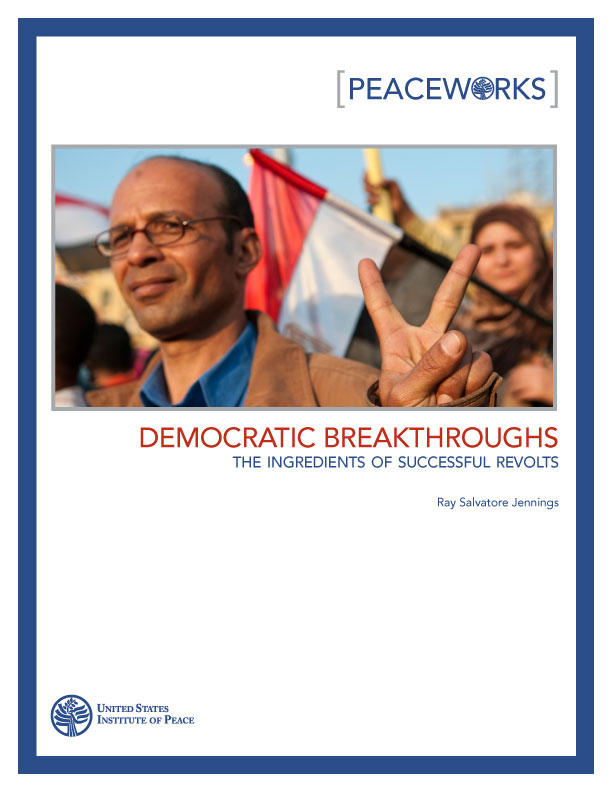Although each revolution is different, each successful case of democratic breakthrough shares common domestic and international influences. This report examines 11 cases of past successes at removing autocratic regimes and establishing elections. It then applies its findings to the emerging revolutions of the Arab Spring.

Summary
- The cases of successful breakthrough examined in this study are the Soviet Union in 1991 and Russia in 1993, Poland in 1989, Serbia in 2000, Ukraine in 2004, Indonesia by 1999, Chile in 1988, and South Africa by 1996. Cases of failed and then ultimately successful democratic transition are Ghana by 2000, Mexico by 2000, South Korea by 1987, and Turkey by 1983. Finally, the cases of failed transition examined are Algeria in 1991, Iran in 1979, China in 1989, and Azerbaijan in 2005.
- Ten domestic influences were found to be common to each of the successful cases of democratic breakthrough examined in this study, including incremental reform victories preceding breakthrough attempts, the presence of coherent oppositions, economic distress and poor service delivery, rising expectations and increasing levels of literacy and education, mass mobilization, a growing influence of civic actors, preservation of independent information flows, reform offers by regimes that only embolden oppositions, robust “get out the vote” and “protect the vote” efforts, and breakthroughs that are largely free from violence.
- Seven types of external influence were identified as influential, including passive factors, such as economic shocks, diffusion, and the influence of norms and ideas; and active factors, such as direct democracy aid, diplomatic influence, economic influence, and reputational influence.
- Even though all of these domestic factors and most of the external ones featured in every successful case of breakthrough, the impact of these precipitants varied in influence from case to case.
- Moreover, the balance of influences ranged considerably. For example, in South Africa, external variables such as diplomatic and economic pressure, democratic socialization, and direct democracy assistance were critical in pressing the regime toward a pacted solution, whereas in Turkey, breakthrough was driven almost entirely by domestic considerations.
- Contributing to the peaceful conduct of breakthroughs is in the interests of the conflict resolution community as much as it serves as an important objective of democracy promotion.
- Implications for democratization policy include the need to identify a breakthrough paradigm to avoid diffuse, poorly coordinated, and sometimes counterproductive external assistance efforts; the importance of providing long-term and fast-track democracy assistance; and the importance of preserving free information flows, especially in states with breakthrough potential.
- Implications for democracy assistance in the field include recognizing the importance of preconditions and sociopolitical context, not overlooking “irregular communities” of dissent, and being willing to utilize liberation methodologies in conjunction with liberation technologies as required.
- Applying the criteria, the countries with the best prospects for successfully completing democratic breakthrough among current Arab Spring revolts are Tunisia and Egypt, with democratic movement, if not breakthrough, possible in Yemen. Libya also holds the potential for completing breakthrough, but the challenges are formidable.
- Important reforms are likely in Morocco and Jordan, where King Abdullah II has become more vulnerable to pressure for political reforms in recent months, and Bahrain may yet host additional democratic reforms in the coming year.
- Little progress is likely in Saudi Arabia, Iran, or Algeria, and Syria continues to be convulsed by violence with few prospects for stability in the near future, leaving the region a mix of success stories, flawed democracies, hybrid regimes, and retrenched autocracies.
About the Report
This study, funded by a grant from the United States Institute of Peace and hosted by Stanford University’s Center on Development, Democracy and the Rule of Law (CDDRL), examines fifteen instances of democratic breakthrough. Eleven of these breakthroughs were considered successful, and four failed. This comparative review of breakthroughs is part of a larger effort by the CDDRL that examines four types of democratic change, including political liberalization, democratic consolidation, postconflict democratic development, and democratic breakthroughs.
This project will result in four volumes, one for each type of democratic change, and each volume will contain approximately eight to fifteen case studies of success and failure. An initial volume of breakthrough case studies is due out in 2012. In the course of preparing this study, Arab Spring revolutions began unfolding throughout the Middle East and North Africa, prompting an unexpected—but welcome—chance to evaluate the value of the case study findings against a new set of breakthroughs in progress. This report reflects the iterative process of not only looking to breakthrough attempts of the past, but also toward the future of revolutions that have just begun throughout the Arab world.
About the Author
Ray Salvatore Jennings’ twenty-five years of operational and academic work on conflict and democratic change includes country director posts and field missions with the United States Institute of Peace (USIP), the United Nations, United States Agency for International Development, and the World Bank in over thirty-five countries. He has served on the faculty of Georgetown and Syracuse Universities, as a senior fellow with USIP in 2002–04 and the Wilson Center in 2006–07, and as a visiting researcher at Stanford University in 2008–09. His current fieldwork and writing focuses on community-based democracy promotion strategies and social accountability mechanisms in the Middle East, North Africa, and Asia.